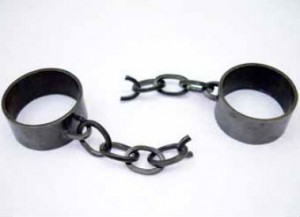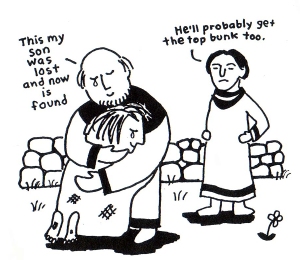3rd Sunday after Pentecost, year C, (proper 5), preached 6/5/16
first reading: 1 Kings 17:17-24
Psalm 30
second reading: Galatians 1:11-24
gospel reading: Luke 7:11-17
Today we continue hearing from St. Paul’s letter to the Galatians – as we did last week, and will for the next four weeks to come.
Last week we read his very angry, person introduction, in which he let the churches in Galatia know, in no uncertain terms, that they were headed down a WRONG path. Today we pick up exactly where we left off, even overlapping verses 11-12.
In our verses today Paul is reminding the Galatians of his “earlier life,” and the life he is leading in their present tense. And he makes a point of saying that only God could bring about such a transition. It’s a very stark “before and after.”
Some people come to faith because they reach a rock bottom and they have nowhere else to turn. This wasn’t the case at all for Paul. He was doing well. He was respected. He was successful and had “advanced… beyond many… of the same age…” He LOVED his Jewish faith, and saw the upstart Christians as WRONG. And he would use his respected position to protect the faith which he loved. He writes, “I was violently persecuting the church of God and was trying to destroy it.”
But in the midst of this success, his life is rudely interrupted – changed forever. The before and after couldn’t be any more different. It all starts in vs. 15-16: “But when God… was pleased to reveal his Son to me…” Without warning, without any desire or effort on his part, his life and purpose were changed forever.
From a worldly perspective it became exponentially harder, filled with persecution from within and without. Within, there were those who challenged his authority – from without, those who saw faith in Jesus as a threat like he once did. The gospel did not make his life better on the outside, it made it worse. He went from powerful to struggling, from persecutor to persecuted.
This is the main argument he gives for the gospel he’s preaching not being of human origin. It must be God’s work, because it makes no earthly sense at all.
The other way Paul makes the argument that his “conversion” is not of human origin, is the enormity of the grace he has received. To be the persecutor, to be the one violently trying to destroy the gospel – then to become its chief evangelist is a sign of mercy that can come only from God.
All the pain Paul caused those early Christians, even perhaps sending some of our earliest martyrs to their deaths – and God says, “I forgive you, and I will use you.” WOW. Think about it.
If God can forgive Paul and then use him to spread the gospel – if Jesus died and rose for Paul – then there’s nothing that could possibly stand in OUR way of receiving God’s mercy and love.
God took a hateful religious zealot bent on revenge and destruction – and turned him into a missionary for love and forgiveness – gave him the call to reach out to EVERYONE even to the Gentiles! God called Paul, the Jewish zealot, to spend most of his mission reaching out to those who were the “other” to him in his previous life. God called Paul, the Jewish zealot, to proclaim to the Gentiles that Jesus loved them too, and that God’s love and grace was just as much for them as for the original followers.
This is a living testimony to the POWER of God to wipe OUR slates clean and give US new beginnings. It’s hard to imagine a modern day equivalent. Perhaps God converting and calling a member of the Westboro Baptist group to become an evangelist proclaiming God’s love for the LGBT community…
If God can extend grace and new life to THIS extreme, imagine what God can do for you and me.
 Is there something that you’ve been holding onto? Something you did (or WAS) years ago? Some embarrassing or hurtful event you were a part of that still eats at you? Do you ever have the feeling that you’re just not good enough? That God couldn’t possibly forgive this “thing” you feel hanging over you?
Is there something that you’ve been holding onto? Something you did (or WAS) years ago? Some embarrassing or hurtful event you were a part of that still eats at you? Do you ever have the feeling that you’re just not good enough? That God couldn’t possibly forgive this “thing” you feel hanging over you?
Even people sitting in churches, even pastors, sometimes have events and feelings either come back to them, or “stuff” they haven’t been able to let go of. But that’s on US, not on God. God isn’t holding onto it, WE are.
KNOW THIS – from Paul’s example – if Jesus forgave Paul, including the destruction he wrought in his life before God “was pleased to reveal his Son to [him],” then God certainly forgives you and me and all the awful things we have done and things that still weigh us down.
Let them go. Because through Jesus they’re already gone.
There’s nothing we have to do – praise God for that. Nothing required for us to do, because Jesus has done it already. As Paul will make clear throughout this letter, in Jesus we’re FREE. Free from having to pay for our sins. Free from all our past mistakes. Free from having to try to be perfect. Free from having to do “a” or “b” to “get” God to love or forgive us.
This is what GRACE is. This is MERCY. An undeserved outpouring of God’s love. It means each day we get a new beginning, a new life. Each time we call our for forgiveness it is there for us because we have been baptized into Jesus’ death and resurrection. Because of this freedom in Christ, we are free to be bold in faith. To try and even fail in serving God, just like Paul.
Our mistakes do NOT define us. Our past does NOT define us. Even our successes do NOT define us. GOD’S GRACE DEFINES US.
And that, Paul says, is not of human origin, or from a human source – THAT power is from God alone. Praise be to God.
AMEN.




